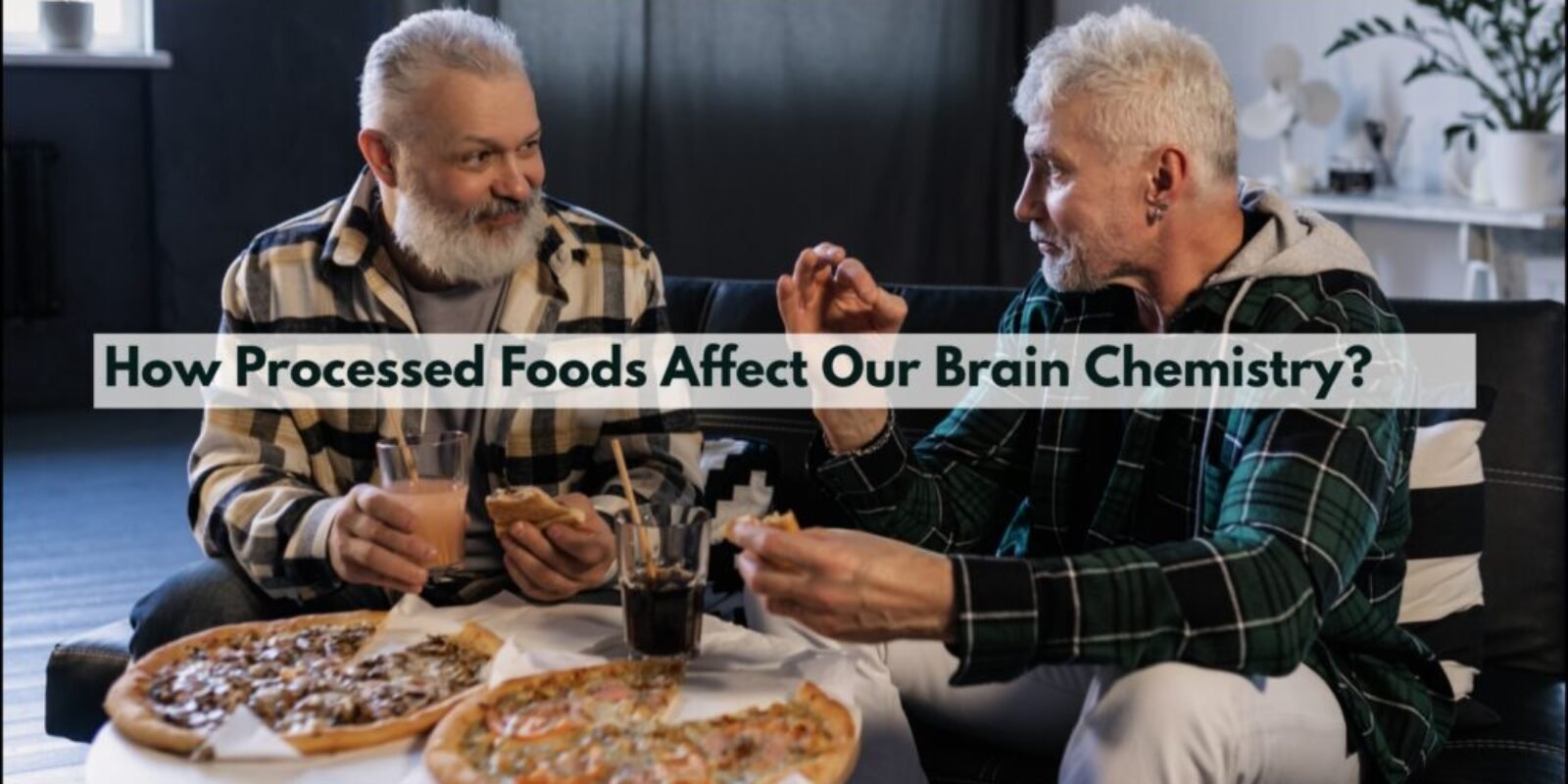Last Updated on June 30, 2025 by Julian Espinosa
Have you ever wondered why you feel sluggish after eating that convenient frozen meal or notice your mood dipping after indulging in packaged snacks? The connection between what we eat and how we feel is more profound than many realize, especially for those in their retirement years. Recent groundbreaking research reveals a startling truth: the more ultra-processed foods we consume, the higher our risk of experiencing depression, anxiety, and other mental health challenges.
This comprehensive guide explores the surprising relationship between processed foods and mental well-being, specifically tailored for seniors who want to maintain their cognitive health and emotional vitality. You’ll discover how ultra-processed foods—those convenient items filling grocery store aisles—affect your brain chemistry and mood in ways that might surprise you.
We’ll examine the scientific findings, including a 2024 study involving nearly 300,000 people across 70 countries that found a clear link between ultra-processed food consumption and mental health struggles. You’ll learn practical strategies for identifying these foods, understanding their impact on your body, and making simple swaps that can significantly improve your mental clarity and emotional balance.
Whether you’re looking to boost your energy levels, improve your mood, or simply feel more like yourself again, this article provides actionable insights that can transform your relationship with food and enhance your overall quality of life during these golden years.
The Hidden Connection Between Processed Foods and Your Mental Health
They are certainly convenient. And they are usually (very deliberately) palate-pleasing with enhanced flavours and textures. But are all such foods unhealthy? The simple answer is ‘no’. Some processed foods make our life simpler while still being highly nutritious. Frozen vegetables, plain yoghurts, canned tomatoes and beans are good examples – although the last two may be high in salt.
Your brain needs proper fuel to function at its best, just like a car needs quality fuel to run smoothly. When we consistently feed our bodies with ultra-processed foods — those convenient, packaged items that dominate grocery store shelves — we’re essentially putting low-grade fuel into our most important organ. Recent research has revealed a concerning connection that deserves your attention: the more processed foods you consume, the higher your risk of experiencing depression, anxiety, and other mental health challenges.
Prefer to listen rather than read?
What Are Ultra-Processed Foods?
Ultra-processed foods are industrial formulations created in laboratories rather than kitchens. These products undergo multiple manufacturing processes and contain ingredients you wouldn’t typically find in your home pantry. Think packaged snacks, frozen dinners, sugary cereals, soft drinks, instant soups, and most fast food items. These foods are designed to be convenient, have long shelf lives, and taste appealing, but they come at a cost to your mental well-being.
What makes these foods particularly concerning is their unique composition. They’re often loaded with artificial additives, preservatives, high levels of sugar, unhealthy fats, and sodium while being stripped of essential nutrients your brain needs to function optimally. The manufacturing process removes fiber, vitamins, minerals, and other beneficial compounds that naturally occur in whole foods.
The foods we are writing about here are those that contain ingredients that would never be found naturally in foods. Obvious examples are:
- High-fructose corn syrup
- Hydrogenated oils
- Artificial sweeteners and
- Artificial colours and flavours
“They are made, by design, for overconsumption,” says says Eduardo A.F. Nilson of the Center for Epidemiological Research in Nutrition and Public Health at the University of São Paulo, who has done extensive research on the subject. “They have hyper-palatability. We say they have hyper-flavors. They will be very sweet, very salty.”
But look at the label. How many of the ingredients are hard to pronounce? That is a good indication of the level of processing. When you can recognise everything on that label, you’re holding a portion of food that is both healthy and convenient even though it is processed. It’s the foods with additives that can and do impact our general health and well-being that you need to be aware of, and also of the impact they can have.

The Convenience Trap
Many people, especially those in their retirement years, find themselves relying more heavily on processed foods for various reasons. Maybe cooking for one or two people seems less appealing, or perhaps physical limitations make meal preparation more challenging. The food industry has capitalized on these needs by creating products that seem like perfect solutions.
However, this convenience comes with hidden costs. These foods are deliberately engineered to be hyperpalatable — meaning they’re designed to make you want more. They trigger the same reward pathways in your brain as addictive substances, making it difficult to eat them in moderation.

Here are some of the ways these foods affect our brain chemistry, in particular:
- Changes in hormone levels due to processed foods
- Impact on neurotransmitter production
- Increased inflammation in the brain
- Altered nutrient absorption
- Disruption of hunger signals
These foods are often high in artificial flavours, preservatives, and other chemicals that can interfere with the natural functioning of our brains. These chemicals can disrupt the production and regulation of neurotransmitters, which are responsible for transmitting messages between nerve cells. As a result, the delicate balance of our brain chemistry can be thrown off, leading to a range of symptoms that affect our mood, emotions, and overall well-being.
How Do Processed Foods Affect Our Brain Chemistry?
our brain is remarkably sensitive to the foods you consume. When you eat ultra-processed foods regularly, several concerning changes occur in your body that directly impact your mental state:
- Blood Sugar Rollercoaster
- Ultra-processed foods typically cause rapid spikes in blood sugar followed by dramatic crashes. These fluctuations can trigger mood swings, irritability, anxiety, and feelings of depression. Your brain requires steady glucose levels to function properly, and these dramatic ups and downs can leave you feeling mentally foggy and emotionally unstable.
- Inflammation Response
- Many ultra-processed foods trigger inflammation throughout your body, including in your brain. Chronic inflammation has been linked to increased rates of depression and anxiety. When your brain is inflamed, it can’t produce the neurotransmitters you need for stable mood and clear thinking.
- Disrupted Gut-Brain Connection
- Your gut and brain communicate constantly through what scientists call the “gut-brain axis.” Ultra-processed foods can disrupt the beneficial bacteria in your digestive system, which affects the production of mood-regulating chemicals like serotonin. Since about 90% of your body’s serotonin is produced in your gut, this disruption can significantly impact your emotional well-being.
- Nutrient Deficiencies
- When ultra-processed foods make up a significant portion of your diet, you’re likely missing out on essential nutrients your brain needs. B vitamins, omega-3 fatty acids, magnesium, and other nutrients are crucial for mental health, and processed foods are typically devoid of these vital compounds.
The Link Between Processed Foods and Mental Health Disorders
As our understanding of the mind-body connection deepens, it has become increasingly clear that the foods we eat can have a significant impact on our mental health. In particular, there is growing evidence that these foods may contribute to the development and exacerbation of various mental health disorders, such as anxiety and depression.
How Are These Foods Linked to Depression?
The consumption of these types of foods has considerably increased in recent times, leading to a higher incidence of depression. There’s no doubt that these foods are attractive due to their cost-effectiveness and availability in contrast to fresh, unprocessed foods. However, they are deficient in nutrition and have adverse effects on our emotional well-being.
Moreover, the consumption of these foods has been linked to chronic inflammation in the body, which can exacerbate mental health issues such as anxiety and depression. Inflammation is the body’s natural response to injury or infection, but when it persists over time, it can lead to a range of health problems. In particular, chronic inflammation has been linked to an increased risk of mental health disorders, including depression and anxiety.
Processed Foods Cause Mood Swings
These foods can cause mood swings due to their high levels of sugar, caffeine, and other stimulants that can result in fluctuations in our moods. These foods can also disrupt the balance of neurotransmitters in the brain, further exacerbating mood swings.
These often contain high amounts of sugar, unhealthy fats, and artificial additives that can lead to depression. Consuming sugar, specifically, can have a noteworthy effect on mood and mental health. Once sugar is consumed, blood sugar levels increase rapidly, causing a short-term energy and mood boost. However, this is frequently followed by a decrease that may cause fatigue, irritability, and a low mood.
Its Role in Anxiety Disorders
Processed foods have been found to have a significant impact on our mental health, including contributing to the development and exacerbation of anxiety disorders. One of the primary ways that these foods can contribute to anxiety is through the presence of caffeine and other stimulants.
Caffeine is a central nervous system stimulant that can increase heart rate, blood pressure, and levels of stress hormones such as cortisol. Consuming high levels of caffeine, as found in these foods and beverages, can lead to feelings of nervousness, jitteriness, and anxiety. Caffeine can also interfere with sleep patterns, which can further exacerbate anxiety symptoms.
These chemicals can overstimulate the nervous system and trigger feelings of anxiety and agitation. Some individuals may also be sensitive to these chemicals and experience more pronounced symptoms of anxiety after consuming processed foods.
Processed Foods and ADHD
Research has shown that there is a link between these types of foods and Attention Deficit Hyperactivity Disorder (ADHD). Children who consume a diet high in these types of foods are more likely to experience symptoms of ADHD. These foods can disrupt the natural balance of neurotransmitters in the brain. This imbalance can lead to hyperactivity and impulsivity, two key symptoms of ADHD.

Neurotransmitters are chemicals that transmit signals between neurons and are crucial for proper brain function. Specifically, the balance of dopamine, norepinephrine, and serotonin – three neurotransmitters that are particularly important in regulating mood, attention, and behaviour – can be disrupted by the consumption of these foods.
When the balance of these neurotransmitters is disrupted, it can lead to hyperactivity and impulsivity, two key symptoms of ADHD. Hyperactivity is characterized by excessive physical activity, fidgeting, and restlessness, while impulsivity is characterized by acting without thinking, interrupting others, and making rash decisions.
The impact of these types of foods on cognitive function has become a growing concern in recent years. These foods can lead to chronic inflammation and oxidative stress, which are believed to contribute to cognitive decline and an increased risk of developing neurological disorders like Alzheimer’s disease and dementia.
Processed Foods and Insomnia
Insomnia, or difficulty falling or staying asleep, is a common problem that affects many people worldwide. While there are many factors that can contribute to insomnia, including stress, anxiety, and certain medications, diet also plays a significant role. Highly processed foods, in particular, have been shown to contribute to insomnia in several ways.
One of the main ways that these types of foods can contribute to insomnia is through their high sugar content. Foods high in sugar, such as candy, soda, and baked goods, can cause a rapid spike in blood sugar levels, followed by a crash. This fluctuation in blood sugar levels can disrupt the body’s natural sleep-wake cycle, making it harder to fall asleep and stay asleep.
These foods can also contain additives like caffeine and other stimulants that can interfere with sleep. Caffeine is a known stimulant that can keep you awake and alert for hours, even if consumed several hours before bedtime. According to the American Academy of Sleep Medicine, caffeine’s half-life is up to 5 hours. That means that after 5 hours, your body may still be retaining half of the caffeine you consumed.
Additionally, many processed foods are high in sodium, which can increase blood pressure and make it harder to fall asleep.
The American Heart Association recommends that adults consume no more than 2,300 milligrams (mg) of sodium per day, which is about one teaspoon of salt.
However, the ideal amount of sodium intake varies depending on age, sex, and overall health. People with high blood pressure or other health conditions may need to consume less sodium. It is important to talk to your doctor about the right amount of sodium for you.
Since so many of the foods we eat are boosted with salt – from bread and cereal to canned products and even drinks and ice cream, it’s not uncommon for someone to consume dangerously high amounts of salt.

Worsen Symptoms of PTSD
Processed foods can worsen symptoms of PTSD. These foods can disrupt the balance of neurotransmitters in the brain, which can make it difficult for people with PTSD to regulate their emotions.
Furthermore, these foods can also disrupt the gut-brain axis, which is the communication pathway between the gut and the brain. The gut microbiome, which is made up of trillions of microorganisms that live in the digestive tract, plays a crucial role in regulating mood, stress, and anxiety.
Consuming processed foods that are low in fibre and high in additives can disrupt the balance of the gut microbiome, leading to dysregulation of the gut-brain axis and worsening the symptoms of PTSD.
The Role of Processed Foods in Addiction
These foods have been shown to have a potential link to addiction. As already covered, they often contain high amounts of sugar, salt, and unhealthy fats, which can lead to cravings and overeating. These foods are designed to be highly palatable and easy to consume, making it difficult for individuals to resist them.
Furthermore, these foods contain additives such as high fructose corn syrup, artificial flavours, and preservatives, which have been shown to have a similar effect on the brain as drugs and alcohol. These additives can activate the brain’s reward system, leading to feelings of pleasure and craving, and ultimately, addiction.
Research has found that individuals who consume a diet high in these kinds of foods are more likely to develop addictive eating behaviours. These behaviours can lead to negative consequences such as weight gain, obesity, and other health problems.
Making Positive Changes
The good news is that you don’t have to completely overhaul your diet overnight to see improvements in your mental health. Small, consistent changes can make a significant difference in how you feel both physically and emotionally.
- Start Reading Labels
- Begin by examining the ingredient lists on packaged foods. If you see ingredients you can’t pronounce or wouldn’t use in your own kitchen, it’s likely an ultra-processed food. Choose items with shorter ingredient lists whenever possible.
- Focus on Whole Foods
- Prioritize foods that are as close to their natural state as possible. Fresh fruits and vegetables, whole grains, lean proteins, nuts, and seeds provide the nutrients your brain needs without the harmful additives found in processed foods.
- Meal Planning Made Simple
- Consider preparing larger batches of homemade meals and freezing portions for later. This approach gives you the convenience you need while ensuring you’re eating nutritious, minimally processed foods.
- Gradual Substitutions
- Instead of eliminating all processed foods immediately, start by replacing one processed item per week with a whole food alternative. For example, swap out instant oatmeal for steel-cut oats, or replace sugary snacks with fresh fruit and nuts.

The Social Aspect of Eating
Food is deeply connected to our social lives and emotional well-being. Many people find comfort in familiar processed foods, and changing eating habits can feel overwhelming. Remember that this journey is about progress, not perfection. Allow yourself grace as you make these changes, and consider involving friends or family members in your efforts to eat more whole foods.
Cooking with others can be a wonderful social activity that also supports your mental health goals. Consider organizing potluck dinners with friends where everyone brings a dish made from whole ingredients, or join a cooking class specifically designed for seniors.
Creating a Support System
Making dietary changes can be challenging, especially if you’ve been relying on processed foods for convenience. Don’t hesitate to seek support from healthcare providers, nutritionists, or support groups. Many communities offer cooking classes, nutrition education programs, and meal delivery services that focus on whole, unprocessed foods.
Your mental health is worth the investment in better nutrition. By gradually reducing your consumption of ultra-processed foods and increasing your intake of whole, nutritious options, you’re taking a powerful step toward better emotional well-being and cognitive health.
Looking Forward
Understanding the connection between processed foods and mental health empowers you to make informed choices about what you eat. Every meal is an opportunity to nourish your brain and support your emotional well-being. The research is clear: the foods you choose have a direct impact on how you feel, think, and experience life.
Your journey toward better mental health through improved nutrition doesn’t have to be perfect or happen overnight. Small, consistent changes add up to significant improvements in how you feel. By choosing whole foods over processed alternatives, you’re investing in your mental clarity, emotional stability, and overall quality of life.
Are you ready to take control of your mental health through better nutrition? What processed foods are you most willing to replace with healthier alternatives?
FAQ: Processed Foods and Mental Health
- How quickly will I notice mental health improvements after reducing processed foods?
- Many people report feeling more energetic and mentally clear within 2-3 weeks of reducing ultra-processed foods. However, individual results vary based on your starting point, overall health, and the extent of dietary changes. Some people notice mood improvements within days, while others may take several weeks to experience significant changes.
- Are all processed foods bad for mental health?
- Not all processed foods are problematic. Minimally processed foods like frozen vegetables, canned beans, or whole grain bread can be part of a healthy diet. The concern lies with ultra-processed foods that contain artificial additives, excessive sugar, unhealthy fats, and lack essential nutrients.
- What are the best whole foods for supporting mental health in seniors?
- Focus on foods rich in omega-3 fatty acids (salmon, walnuts), B vitamins (leafy greens, beans), magnesium (nuts, seeds), and antioxidants (berries, colorful vegetables). These nutrients support brain function and can help stabilize mood.
- Is it too late to improve my mental health through diet changes at my age?
- It’s never too late to benefit from improved nutrition. Your brain has remarkable plasticity and can respond positively to better nutrition at any age. Many seniors report significant improvements in mood, energy, and cognitive function after making dietary changes.
- How can I afford to eat more whole foods on a fixed income?
- Whole foods can be budget-friendly when you focus on seasonal produce, buy in bulk, cook at home, and utilize frozen vegetables and fruits. Many communities offer senior discounts at farmers markets, and programs like SNAP provide assistance for purchasing nutritious foods.
- What should I do if I have physical limitations that make cooking difficult?
- Consider meal delivery services that focus on whole foods, ask family members for cooking assistance, or look into community programs that provide prepared healthy meals for seniors. Pre-cut vegetables and simple preparation methods can also make cooking more manageable.
- Can I still enjoy treats and social eating while improving my mental health?
- Absolutely. The goal isn’t to eliminate all enjoyable foods but to create a balance where whole foods make up the majority of your diet. Occasional treats are part of a healthy relationship with food, especially in social settings.
- How do I know if my mental health symptoms are related to diet or something else?
- While diet can significantly impact mental health, it’s important to work with healthcare providers to rule out other causes. Keep a food and mood journal to track potential connections, and discuss your findings with your doctor or a registered dietitian.
Disclaimer
The content provided on MySeniors.World is for informational purposes only and is not intended as either financial or medical advice. Always consult a qualified professional before making any investment or health-related decisions.
Posts may contain affiliate links, meaning we earn a commission – at no additional cost to you, if you click through and make a purchase. Your support helps us continue providing valuable content.



